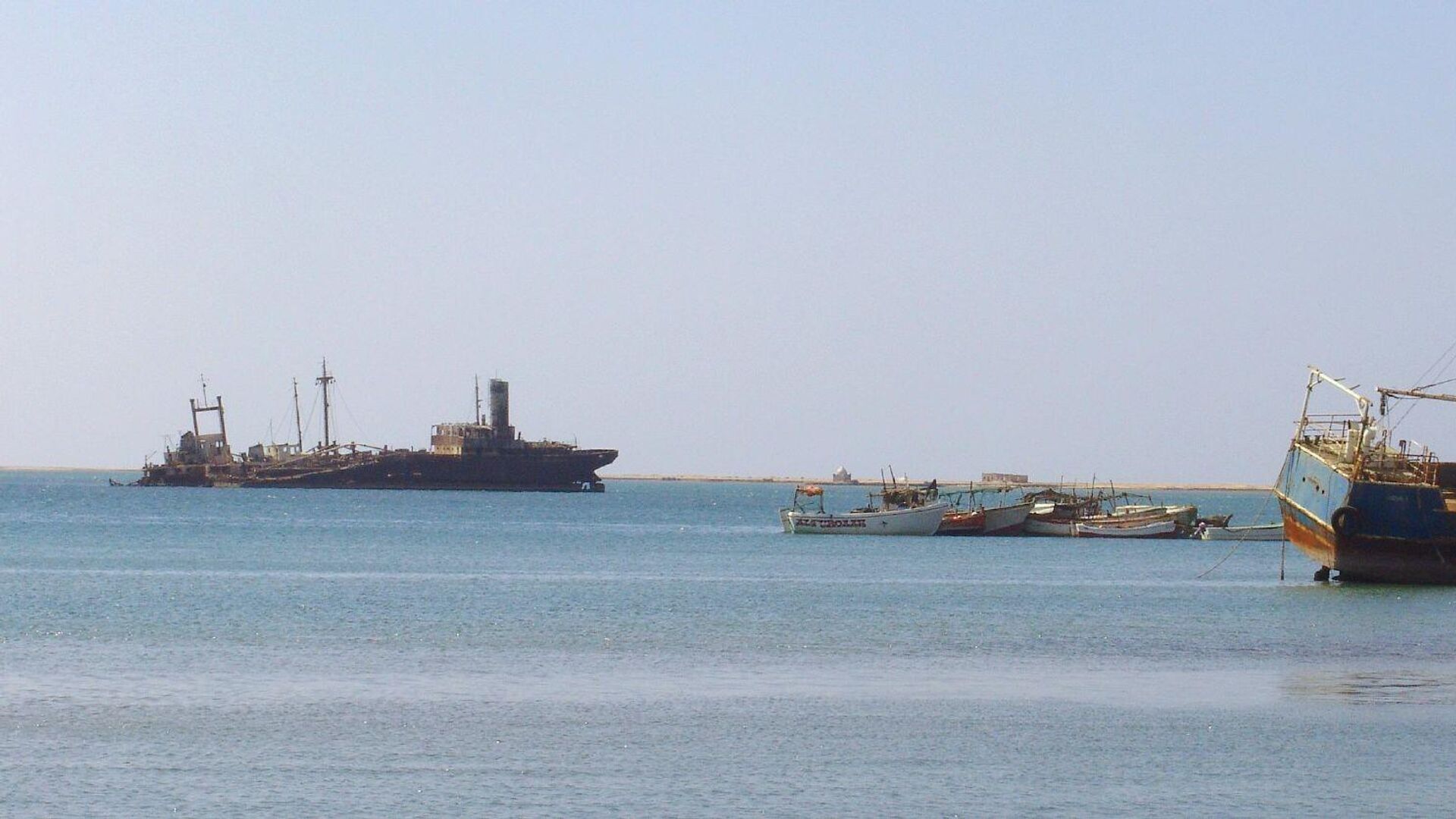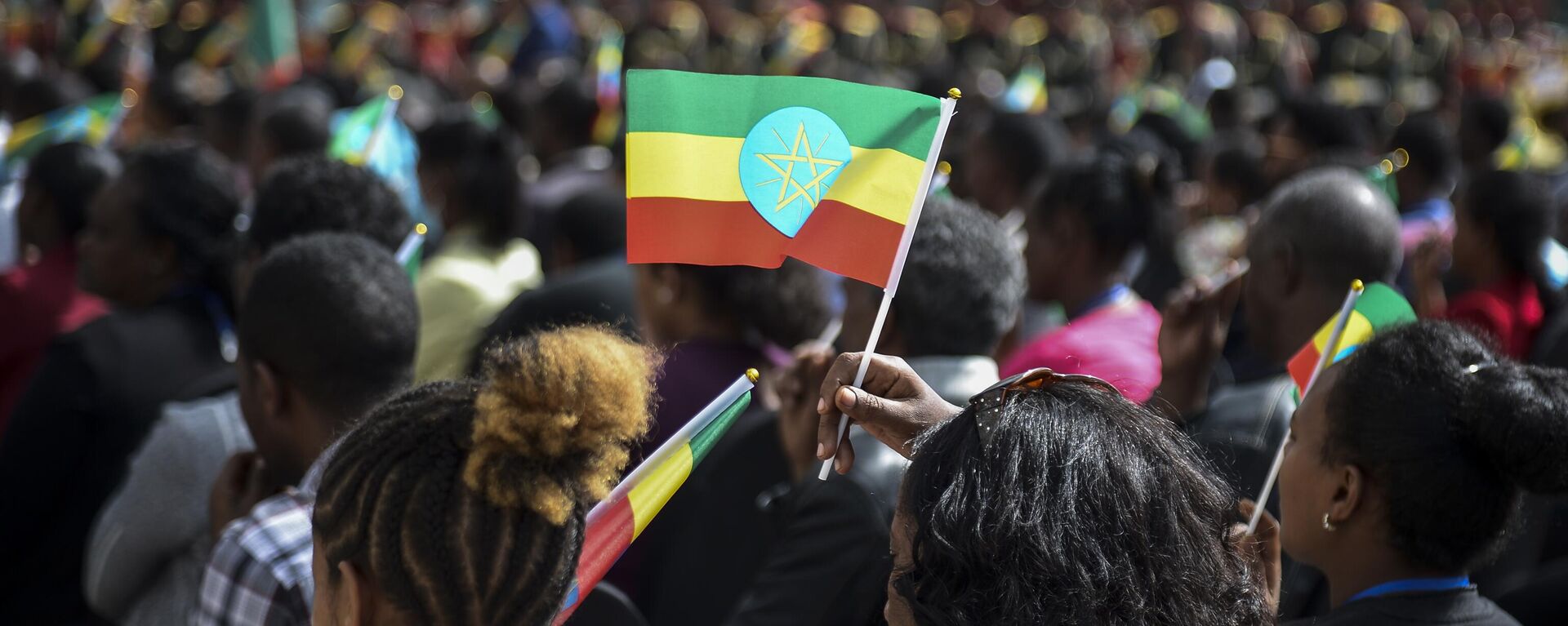https://en.sputniknews.africa/20240112/very-good-move-expert--ex-envoy-on-benefits-of-sea-agreement-with-somaliland-for-ethiopia-1064585458.html
'Very Good Move': Expert & Ex-Envoy on Benefits of Sea Agreement With Somaliland for Ethiopia
'Very Good Move': Expert & Ex-Envoy on Benefits of Sea Agreement With Somaliland for Ethiopia
Sputnik Africa
In early January, Ethiopia and unrecognized Somaliland signed a memorandum to secure Addis Ababa's access to the Red Sea. In response, Somali President Hassan... 12.01.2024, Sputnik Africa
2024-01-12T15:06+0100
2024-01-12T15:06+0100
2024-01-12T16:28+0100
opinion
ethiopia
east africa
africa insight
al-shabaab
hassan sheikh mohamud
somaliland
somalia
intergovernmental authority on development (igad)
russia
https://cdn1.img.sputniknews.africa/img/07e8/01/0c/1064586743_0:0:1486:836_1920x0_80_0_0_b063f6bb4020b9f7edb9798312d36e60.jpg
The Memorandum of Understanding between Ethiopia and Somaliland on access to seaports is a window of opportunity for Addis Ababa in both economic and geopolitical dimensions, Mekuria Mekasha, Assistant professor of journalism and communication, Addis Ababa University, told Sputnik Africa.In the context of the economy, the expert noted that Ethiopia needs access to the sea to foster economic development, highlighting country's significant population of 120 million people.The expert added that Ethiopia needs economic development as it sends a lot of products to Djibouti, Somalia and other countries in the southern Horn of Africa.In addition, Mekasha noted the cost of Ethiopia's current use of the port of Djibouti, saying that its utilization costs Ethiopia more than $1 billion, which will be "terrible" for the country.On the geopolitical dimension, the expert said that the memorandum, which among other things mentions the establishment of a naval force, will enable Ethiopia to patrol ships in the Red Sea from pirates and terrorists and strengthen the country's cooperation in the region.He suggested that Ethiopia's cooperation with Somaliland could encourage other countries in the region such as Eritrea, Djibouti, Kenya and Sudan to lease their ports to Ethiopia.Addressing concerns about potential implications for regional stability, the expert highlighted Ethiopia's historical commitment to the matter. He emphasized Ethiopia's active role in fighting al-Shabaab in Somalia and how the collaboration with Somaliland could positively contribute to political dynamics in the region.In this vein, the researcher expressed the belief that Somalia, which has signed a law "nullifying" the agreement between Ethiopia and Somaliland, needs to reconsider the situation in light of the country's current terrorist challenges.'Ethiopia Does Not Intend to Get Lost in Coming African Century,' Ex-Ambassador SaysThrough the Memorandum of Understanding with Somaliland, Ethiopia strengthens its strategic position in the Horn of Africa and legally formalizes its de facto status as the demographic and resource leader of the region, Hassan Daud, former ambassador of Somalia to Russia, told Sputnik Africa.The former ambassador added that Ethiopia "is forging an entirely new reality" by restoring Somaliland's international status "that has been in the shadow of Somalia since 1960."He also commented on the position of IGAD, which expressed concern about the memorandum's "potential implications for regional stability." Daud called IGAD's concerns "expected but not entirely fair" and pointed to positive factors in the agreement, such as the development of maritime security in the face of increased piracy and terrorism, and the development of maritime logistics in the region.Regarding the law signed by the President of Somalia "nullifying" the agreement between Ethiopia and Somaliland, Daud called it "the basis for aggravating the situation and an absolutely wrong decision from the point of view of international law."On January 2, Somalia recalled its ambassador to Ethiopia, a day after Addis Ababa inked the memorandum of understanding with the breakaway region of Somaliland that granted the landlocked Horn of Africa nation access to the Red Sea. *A terrorist organization banned in Russia and many other states.
https://en.sputniknews.africa/20240111/ethiopias-diplomacy-made-significant-contribution-to-africa-fm-says-as-diplomacy-week-opens-1064571293.html
ethiopia
east africa
somaliland
somalia
russia
red sea
Sputnik Africa
feedback@sputniknews.com
+74956456601
MIA „Rossiya Segodnya“
2024
Maxim Grishenkin
https://cdn1.img.sputniknews.africa/img/07e7/0a/17/1063018107_0:0:1104:1103_100x100_80_0_0_03090c85a11f5d2e8a19cf1d989443c9.jpg
Maxim Grishenkin
https://cdn1.img.sputniknews.africa/img/07e7/0a/17/1063018107_0:0:1104:1103_100x100_80_0_0_03090c85a11f5d2e8a19cf1d989443c9.jpg
News
en_EN
Sputnik Africa
feedback@sputniknews.com
+74956456601
MIA „Rossiya Segodnya“
Sputnik Africa
feedback@sputniknews.com
+74956456601
MIA „Rossiya Segodnya“
Maxim Grishenkin
https://cdn1.img.sputniknews.africa/img/07e7/0a/17/1063018107_0:0:1104:1103_100x100_80_0_0_03090c85a11f5d2e8a19cf1d989443c9.jpg
ethiopia, east africa, africa insight, al-shabaab, hassan sheikh mohamud, somaliland, somalia, intergovernmental authority on development (igad), russia, grain, red sea, ship
ethiopia, east africa, africa insight, al-shabaab, hassan sheikh mohamud, somaliland, somalia, intergovernmental authority on development (igad), russia, grain, red sea, ship
'Very Good Move': Expert & Ex-Envoy on Benefits of Sea Agreement With Somaliland for Ethiopia
15:06 12.01.2024 (Updated: 16:28 12.01.2024) In early January, Ethiopia and unrecognized Somaliland signed a memorandum to secure Addis Ababa's access to the Red Sea. In response, Somali President Hassan Sheikh Mohamud, threatened to use all means to prevent Ethiopia from accessing the sea at the expense of territory Somalia considers its own.
The Memorandum of Understanding between Ethiopia and Somaliland on access to seaports is a window of opportunity for Addis Ababa in both economic and geopolitical dimensions, Mekuria Mekasha, Assistant professor of journalism and communication, Addis Ababa University, told Sputnik Africa.
In the context of the economy, the expert noted that Ethiopia needs access to the sea to foster economic development, highlighting country's significant population of 120 million people.
"It is a huge population that Ethiopia has, and also it is a huge country. Economically, Ethiopia is developing so it needs ports and also a seaway to develop its economy. For economic development, ports are a very important one," Mekasha said, adding that not having ports "will hinder" economic improvement. "So this move is a very good move for Ethiopia and also for Somaliland."
The expert added that Ethiopia needs economic development as it sends a lot of products to Djibouti, Somalia and other countries in the southern Horn of Africa.
In addition, Mekasha noted the cost of Ethiopia's current use of the port of Djibouti, saying that its utilization costs Ethiopia more than $1 billion, which will be "terrible" for the country.
On the geopolitical dimension, the expert said that the memorandum, which among other things
mentions the establishment of a naval force, will enable Ethiopia to patrol ships in the Red Sea from pirates and terrorists and strengthen the country's cooperation in the region.
"Actually, Ethiopia has many marine ships so, if you have a naval force in that area it is easier to patrol the Red Sea and the Gulf of Aden in the Indian Ocean from pirates, and also al-Shabaab* [which] is working in Somalia, a terrorist group. I think this is a good move for the country's development in the area and the collaboration," Mekasha opined.
He suggested that Ethiopia's cooperation with Somaliland could encourage other countries in the region such as Eritrea, Djibouti, Kenya and Sudan to lease their ports to Ethiopia.
"It is an opportunity for Ethiopia and to other neighboring countries if they see this situation very positively," Mekasha pointed out.
Addressing concerns about potential implications for
regional stability, the expert highlighted Ethiopia's historical commitment to the matter. He emphasized Ethiopia's active role in fighting al-Shabaab in Somalia and how the collaboration with Somaliland could positively contribute to political dynamics in the region.
"Ethiopian forces were also very successful in fighting the al-Shabaab, no other country is successful in fighting al-Shabaab. If Somalia is against Ethiopia, al-Shabaab will actively work in that region, so it is problematic not only for Somalia, for other countries including major European powers and also America," Mekasha remarked.
In this vein, the researcher expressed the belief that Somalia, which
has signed a law "nullifying" the agreement between Ethiopia and Somaliland, needs to reconsider the situation in light of the country's current terrorist challenges.
"If things are in a bad situation in this case, if the relation is bad with Ethiopia and also Somaliland, the al-Shabaab group will survive and may even control the Somali government. The Somali government has to rethink again and again, in order to get some benefit from this collaboration," he concluded.
'Ethiopia Does Not Intend to Get Lost in Coming African Century,' Ex-Ambassador Says
Through the Memorandum of Understanding with Somaliland, Ethiopia strengthens its strategic position in the Horn of Africa and legally formalizes its de facto status as the demographic and resource leader of the region, Hassan Daud, former ambassador of Somalia to Russia, told Sputnik Africa.
"Ethiopia has demonstrated a desire to increasingly play a regional leadership role, setting policy on both economic and security issues. This country clearly does not intend to get lost in the coming African Century," Daud said, adding that the agreement will also allow Ethiopia to build strategic ties with Somaliland's long-time Arab partners.
The former ambassador added that Ethiopia "is forging an entirely new reality" by restoring Somaliland's international status "that has been in the shadow of Somalia since 1960."
He also commented on the position of IGAD, which expressed concern about the memorandum's "potential implications for regional stability." Daud called IGAD's concerns "expected but not entirely fair" and pointed to positive factors in the agreement, such as the development of maritime security in the face of increased piracy and terrorism, and the development of maritime logistics in the region.
"Like 'Captain Obvious,' they say things that no one can argue with. But… Politics cannot always be pleasant to absolutely everyone; Ethiopia, like Somaliland, cannot, like the American dollar, please everyone. The question here is different - both Ethiopia and Somaliland are promoting their national interests without infringing on other players in the Horn of Africa," the former ambassador remarked.
Regarding the law signed by the President of
Somalia "nullifying" the agreement between Ethiopia and Somaliland, Daud called it "the basis for aggravating the situation and an absolutely wrong decision from the point of view of international law."
"A unilateral withdrawal from a bilateral deal will clearly not strengthen trust between Somalia and Somaliland, which, given the constant threat of armed conflict, is clearly a worrying signal," he said.
On January 2, Somalia recalled its ambassador to Ethiopia, a day after Addis Ababa inked the memorandum of understanding with the breakaway region of Somaliland that granted the landlocked Horn of Africa nation access to the Red Sea.
*A terrorist organization banned in Russia and many other states.



